-
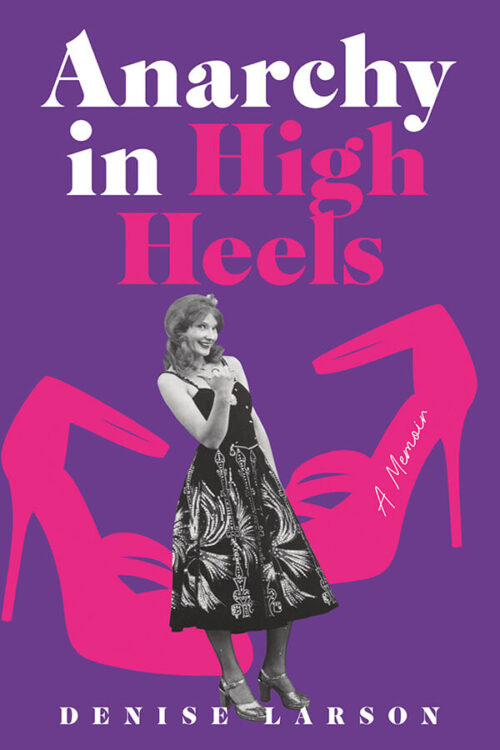 Anarchy in High Heels is not a state of dress; it’s a state of mind. A San Francisco porno theater might be the last place you’d expect to plant the seed of a feminist troupe, but truth is stranger than fiction. In 1972, access to birth control and a burn-your-bra ethos were leading young women to repudiate their 1950s conservative upbringing and embrace a new liberation. Denise Larson was a timid twenty-four-year-old actress wannabe when, at an after-hours countercultural event, The People’s Nickelodeon, she accidentally created Les Nickelettes. This banding together of ¬¬like-minded women with an anything-goes spirit unlocked a deeply hidden female humor. For the first time, Denise allowed the suppressed satirical thoughts dancing through her head to come out in the open. Together with Les Nickelettes, which quickly became a brazen women’s lib troupe, she presented a series of feminist skits, stunts, and musical comedy plays. In 1980, The Bay Guardian described the group as “nutty, messy, flashy, trashy, and very funny.” With sisterhood providing the moxie, Denise took on leadership positions not common for women at the time: playwright, stage director, producer, and administrative/artistic director. But, in the end, the most important thing she learned was the power of female friendship.
Anarchy in High Heels is not a state of dress; it’s a state of mind. A San Francisco porno theater might be the last place you’d expect to plant the seed of a feminist troupe, but truth is stranger than fiction. In 1972, access to birth control and a burn-your-bra ethos were leading young women to repudiate their 1950s conservative upbringing and embrace a new liberation. Denise Larson was a timid twenty-four-year-old actress wannabe when, at an after-hours countercultural event, The People’s Nickelodeon, she accidentally created Les Nickelettes. This banding together of ¬¬like-minded women with an anything-goes spirit unlocked a deeply hidden female humor. For the first time, Denise allowed the suppressed satirical thoughts dancing through her head to come out in the open. Together with Les Nickelettes, which quickly became a brazen women’s lib troupe, she presented a series of feminist skits, stunts, and musical comedy plays. In 1980, The Bay Guardian described the group as “nutty, messy, flashy, trashy, and very funny.” With sisterhood providing the moxie, Denise took on leadership positions not common for women at the time: playwright, stage director, producer, and administrative/artistic director. But, in the end, the most important thing she learned was the power of female friendship. -
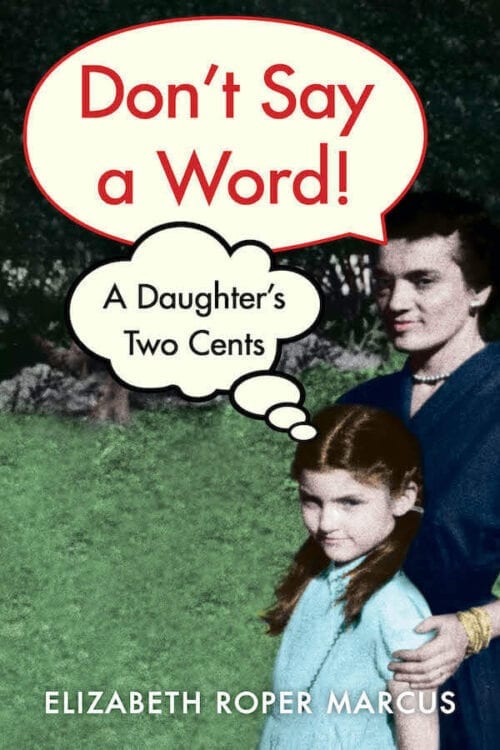 Edna and Leo, a perpetually waring, tyrannical pair in their 80s, begin wintering In Mexico, where they abandon their usual prudence to embrace adventure and a bevy of sketchy new friends. Soon, Edna adopts a pair of wacky, shyster builders whom she trusts over her own architect-daughter Elizabeth, and a farcical house results. Blithely indifferent to the calamities that result, the pair refuse all help from their too-compliant only child. Later, following her mother’s sudden death, Elizabeth’s wise, principled father attempts to fill his late wife’s shoes with a string of loopy, live-in housekeepers—with privileges, he hopes. Before it is over the Mexican escapade will bring down the kind of disasters commonly found in pulp fiction. Why can’t Elizabeth stop any of this from happening? No matter the madness, she cannot confront her parents any more than she ever could. In the end, the surprising way in which they come undone reveals just what they spent their lives trying to hide, thereby setting her free. Though unique in its loony details, Don’t Say A Word! will resonate with beleaguered adult-children everywhere who will recognize the special misery of watching, helpless, as stubborn, diminished parents careen precariously toward the end of life.
Edna and Leo, a perpetually waring, tyrannical pair in their 80s, begin wintering In Mexico, where they abandon their usual prudence to embrace adventure and a bevy of sketchy new friends. Soon, Edna adopts a pair of wacky, shyster builders whom she trusts over her own architect-daughter Elizabeth, and a farcical house results. Blithely indifferent to the calamities that result, the pair refuse all help from their too-compliant only child. Later, following her mother’s sudden death, Elizabeth’s wise, principled father attempts to fill his late wife’s shoes with a string of loopy, live-in housekeepers—with privileges, he hopes. Before it is over the Mexican escapade will bring down the kind of disasters commonly found in pulp fiction. Why can’t Elizabeth stop any of this from happening? No matter the madness, she cannot confront her parents any more than she ever could. In the end, the surprising way in which they come undone reveals just what they spent their lives trying to hide, thereby setting her free. Though unique in its loony details, Don’t Say A Word! will resonate with beleaguered adult-children everywhere who will recognize the special misery of watching, helpless, as stubborn, diminished parents careen precariously toward the end of life. -
 As Diana surveyed her newborn baby’s face, languid body, and absent cry, she knew something was wrong. Then the doctors delivered devastating news: her first child, Emma, had been born with a rare genetic disorder that would leave her profoundly physically and intellectually disabled. Diana imagined life with a child with disabilities as a dark and insular one—a life in which she would be forced to exist in the periphery alongside her daughter. Convinced of her inability to love her “imperfect” child and give her the best care and life she deserved, Diana gave Emma up for adoption. But as with all things that are meant to be, Emma found her way back home. As Emma grew, Diana watched her live life determinedly and unapologetically, radiating love always. Emma evolved from a survivor to a warrior, and the little girl that Diana didn’t think she could love enough rearranged her heart. In her short eighteen years of life, Emma gifted her family the indelible lesson of the healing and redemptive power of love. This is a mother’s requiem to her perfectly imperfect child—a child who left too soon, but whose lessons continue to inspire a life lived and loved.
As Diana surveyed her newborn baby’s face, languid body, and absent cry, she knew something was wrong. Then the doctors delivered devastating news: her first child, Emma, had been born with a rare genetic disorder that would leave her profoundly physically and intellectually disabled. Diana imagined life with a child with disabilities as a dark and insular one—a life in which she would be forced to exist in the periphery alongside her daughter. Convinced of her inability to love her “imperfect” child and give her the best care and life she deserved, Diana gave Emma up for adoption. But as with all things that are meant to be, Emma found her way back home. As Emma grew, Diana watched her live life determinedly and unapologetically, radiating love always. Emma evolved from a survivor to a warrior, and the little girl that Diana didn’t think she could love enough rearranged her heart. In her short eighteen years of life, Emma gifted her family the indelible lesson of the healing and redemptive power of love. This is a mother’s requiem to her perfectly imperfect child—a child who left too soon, but whose lessons continue to inspire a life lived and loved. -
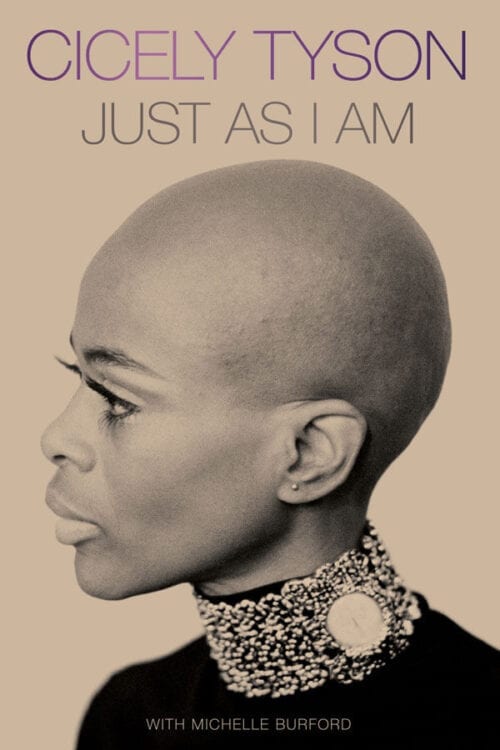 “In her long and extraordinary career, Cicely Tyson has not only exceeded as an actor, she has shaped the course of history.” –President Barack Obama, 2016 Presidential Medal of Honor ceremony “Just As I Am is my truth. It is me, plain and unvarnished, with the glitter and garland set aside. In these pages, I am indeed Cicely, the actress who has been blessed to grace the stage and screen for six decades. Yet I am also the church girl who once rarely spoke a word. I am the teenager who sought solace in the verses of the old hymn for which this book is named. I am a daughter and mother, a sister, and a friend. I am an observer of human nature and the dreamer of audacious dreams. I am a woman who has hurt as immeasurably as I have loved, a child of God divinely guided by His hand. And here in my ninth decade, I am a woman who, at long last, has something meaningful to say.” –Cicely Tyson
“In her long and extraordinary career, Cicely Tyson has not only exceeded as an actor, she has shaped the course of history.” –President Barack Obama, 2016 Presidential Medal of Honor ceremony “Just As I Am is my truth. It is me, plain and unvarnished, with the glitter and garland set aside. In these pages, I am indeed Cicely, the actress who has been blessed to grace the stage and screen for six decades. Yet I am also the church girl who once rarely spoke a word. I am the teenager who sought solace in the verses of the old hymn for which this book is named. I am a daughter and mother, a sister, and a friend. I am an observer of human nature and the dreamer of audacious dreams. I am a woman who has hurt as immeasurably as I have loved, a child of God divinely guided by His hand. And here in my ninth decade, I am a woman who, at long last, has something meaningful to say.” –Cicely Tyson -
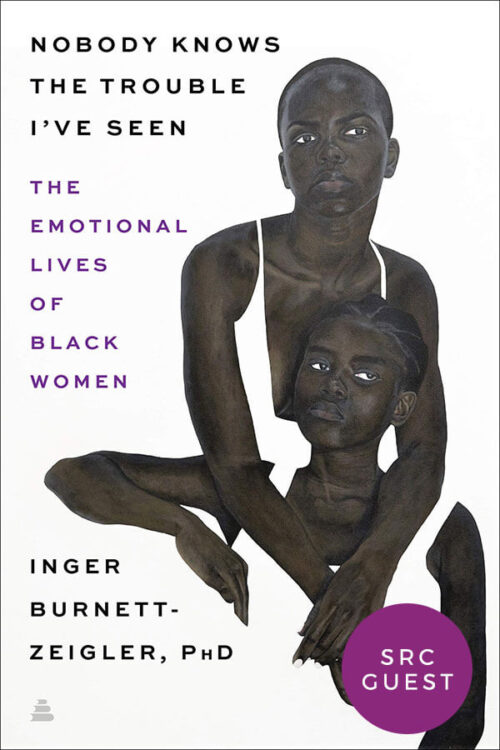 Black women are beautiful, intelligent and capable —but mostly they embrace strong. Esteemed clinical psychologist, Dr. Inger Burnett-Zeigler, praises the strength of women, while exploring how trauma and adversity have led to deep emotional pain and shaped how they walk through the world. Black women’s strength is intimately tied to their unacknowledged suffering. An estimated eight in ten have endured some form of trauma—sexual abuse, domestic abuse, poverty, childhood abandonment, victim/witness to violence, and regular confrontation with racism and sexism. Nobody Knows the Trouble I’ve Seen shows that trauma often impacts mental and physical well-being. It can contribute to stress, anxiety, PTSD, and depression. Unaddressed it can lead to hypertension, diabetes, heart disease, overeating, and alcohol and drug abuse, and other chronic health issues. Dr. Burnett-Zeigler explains that the strong Black woman image does not take into account the urgency of Black women’s needs, which must be identified in order to lead abundant lives. It interferes with her relationships and ability to function day to day. Through mindfulness and compassionate self-care, the psychologist offers methods for establishing authentic strength from the inside out. This informative guide to healing, is life-changing, showing Black women how to prioritize the self and find everyday joys in self-worth, as well as discover the fullness and beauty within both her strength and vulnerability.
Black women are beautiful, intelligent and capable —but mostly they embrace strong. Esteemed clinical psychologist, Dr. Inger Burnett-Zeigler, praises the strength of women, while exploring how trauma and adversity have led to deep emotional pain and shaped how they walk through the world. Black women’s strength is intimately tied to their unacknowledged suffering. An estimated eight in ten have endured some form of trauma—sexual abuse, domestic abuse, poverty, childhood abandonment, victim/witness to violence, and regular confrontation with racism and sexism. Nobody Knows the Trouble I’ve Seen shows that trauma often impacts mental and physical well-being. It can contribute to stress, anxiety, PTSD, and depression. Unaddressed it can lead to hypertension, diabetes, heart disease, overeating, and alcohol and drug abuse, and other chronic health issues. Dr. Burnett-Zeigler explains that the strong Black woman image does not take into account the urgency of Black women’s needs, which must be identified in order to lead abundant lives. It interferes with her relationships and ability to function day to day. Through mindfulness and compassionate self-care, the psychologist offers methods for establishing authentic strength from the inside out. This informative guide to healing, is life-changing, showing Black women how to prioritize the self and find everyday joys in self-worth, as well as discover the fullness and beauty within both her strength and vulnerability. -
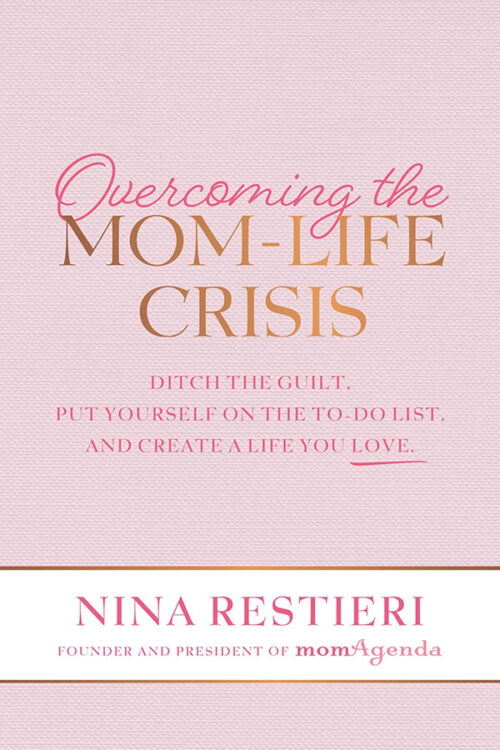 Soulful and excruciatingly honest, Overcoming the Mom-Life Crisis is the essential handbook for stressed-out and overwhelmed moms, offering up steps for creating your own momAgenda and finding lifelong happiness and fulfillment. From the founder of momAgenda comes the ultimate guide to navigating the mom-life crisis, with a simple process for putting your own long-forgotten needs back on the to-do list. Nina Restieri was a wife, a mom of four young kids, and a successful entrepreneur. Despite having what most people would consider “it all,” happiness eluded her. She beat herself up daily for not being grateful. But as she looked around, she realized most of the moms she knew shared that same sense of sadness, stress, and overwhelm, all while working hard to keep up the “perfect mom” appearance. Desperate for a change and tired of crying behind a locked bathroom door, Nina embarked upon a ten-year journey that led her to unexpected places—including a pole dancing studio—for peace and solace. After digging deep and facing some painful truths, Nina emerged knowing she deserved more than she was giving herself and figured out that a mom can take care of her kids, and take care of herself. Like a permission slip for mothers to love themselves as much as they do their children, this book chronicles Nina’s journey to putting her mom-life crisis behind her—forever—and offers up a roadmap so you can too.
Soulful and excruciatingly honest, Overcoming the Mom-Life Crisis is the essential handbook for stressed-out and overwhelmed moms, offering up steps for creating your own momAgenda and finding lifelong happiness and fulfillment. From the founder of momAgenda comes the ultimate guide to navigating the mom-life crisis, with a simple process for putting your own long-forgotten needs back on the to-do list. Nina Restieri was a wife, a mom of four young kids, and a successful entrepreneur. Despite having what most people would consider “it all,” happiness eluded her. She beat herself up daily for not being grateful. But as she looked around, she realized most of the moms she knew shared that same sense of sadness, stress, and overwhelm, all while working hard to keep up the “perfect mom” appearance. Desperate for a change and tired of crying behind a locked bathroom door, Nina embarked upon a ten-year journey that led her to unexpected places—including a pole dancing studio—for peace and solace. After digging deep and facing some painful truths, Nina emerged knowing she deserved more than she was giving herself and figured out that a mom can take care of her kids, and take care of herself. Like a permission slip for mothers to love themselves as much as they do their children, this book chronicles Nina’s journey to putting her mom-life crisis behind her—forever—and offers up a roadmap so you can too. -
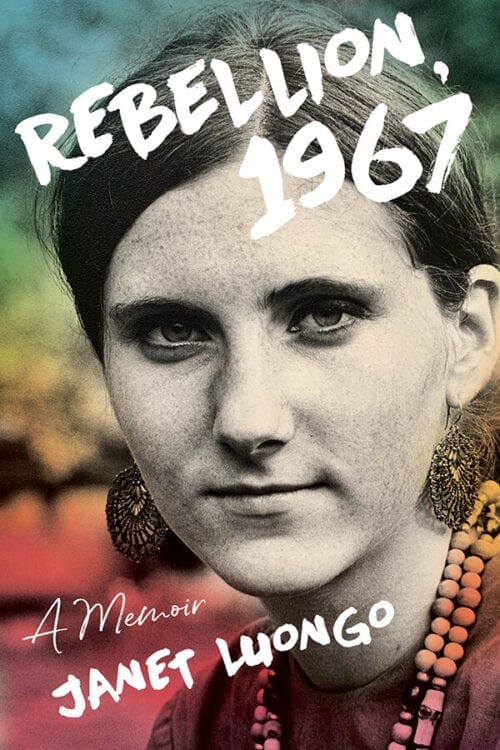
Janet Duffy, a spunky, seventeen-year-old Irish girl, is eager to start college―but instability between her alcoholic father and self-absorbed mother jeopardize her dream, so she sets up her own apartment with her younger sister in Jamaica, Queens, and treks to City College in Manhattan, New York. The routine is deadening, but she finds purpose in the black community, working for a mural painter and volunteering for a civil rights activist.
After turning eighteen, Janet marches with Dr. Martin Luther King, Jr. and falls for a young black saxophone player, Carmen. Her father, a policeman, explodes over their relationship, so Janet rebels―runs away with the jazz musician, and then winds up in the East Village in the Summer of Love. In the ensuing months she deals with heartbreak, sexual harassment, poverty, and danger―but eventually, she asks for the help she needs in order to pick up the pieces of her life and return to her dream. -
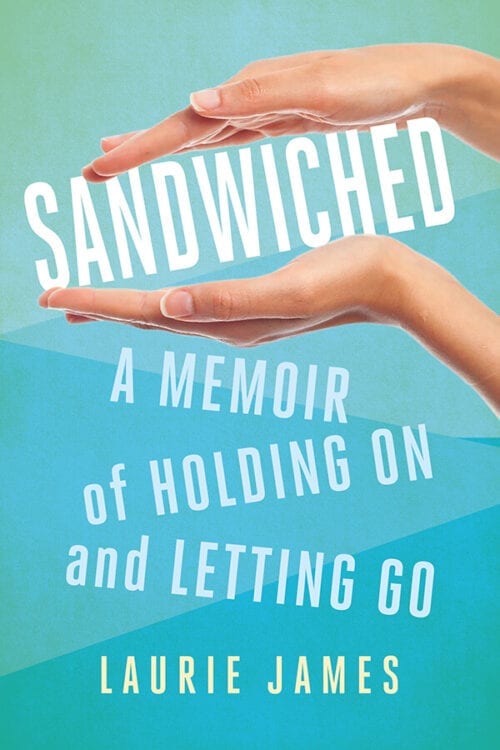
Laurie James spent most of her life wondering what it means to belong; loneliness dictated the choices she made. She rarely shared this secret with others, however; it was always hidden behind a carefree and can-do attitude. When she’s in her mid-forties, Laurie’s mother has a heart attack and her husband’s lawyer delivers some shocking news. She suddenly finds herself sandwiched between caring for her parents, managing unruly caregivers, raising four teenage daughters, and trying to understand the choices of the husband she thought she knew. Laurie’s story is about one woman’s struggle to “do it all” while facing the reality that the “ideal life” and “perfect family” she believed could save her was slowly crumbling beneath her. Laurie tries everything to keep her family together―seeks therapy, practices yoga, rediscovers nature, develops strong female friends, and begins writing―but as she explores the layers of her life and heals her past, she realizes that she’s the only one who can create the life she wants and deserves. Sandwiched is a memoir about what it means to let go of the life you planned in order to find the life you belong to.
-
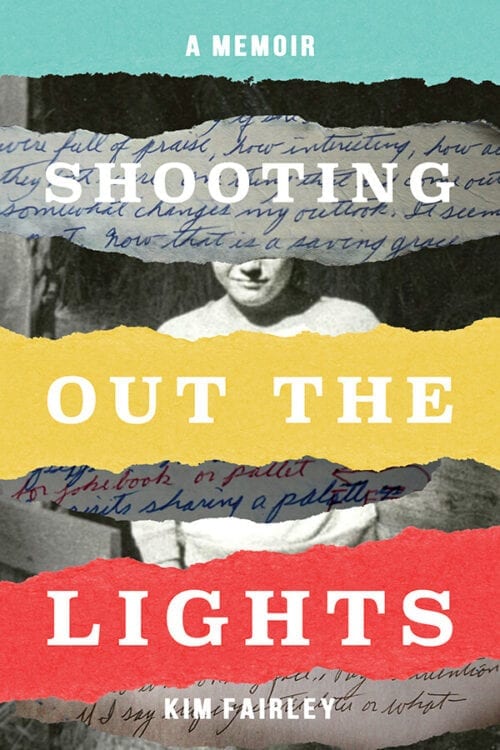
Kim Fairley was twenty-four when she fell in love with and married a man who was fifty-six. Something about Vern–his quirkiness, his humor, his devilish smile–made her feel an immediate connection with him. She quickly became pregnant, but instead of the idyllic interlude she’d imagined as she settled into married life and planned for their family, their love was soon tested by the ghosts of Vern’s past–a town, a house, a family, a memory–Vern’s failing health, and the unexpected arrival of a visitor.
Shooting Out the Lights is a May-December love story that explores the ongoing, wrenching aftermath of gun violence and the healing that comes with confronting the past. -
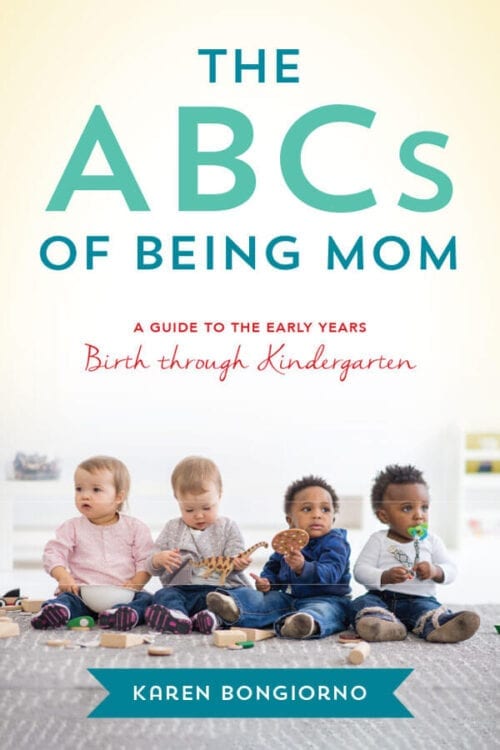
Moms enter the world of motherhood with no sense of the impact that entry will have upon them. They need orientation and guidance to get through this bewildering maze―and The ABC’s of Being Mom, with its abundance of wisdom acquired directly from the trenches of motherhood struggles, is that roadmap.
In this instructive guide, Karen Bongiorno addresses the changes parenthood brings and how to manage them, the importance of being part of a supportive community and taking time for personal care and restoration, the need for equal participation from spouses or partners, and more, with a steady voice of encouragement and understanding that will get moms through even the toughest of times. The wise friend every mom needs to accompany her in her new role, The ABC’s of Being Mom offers mothers everything they need to feel confident in managing motherhood so they can rid themselves of useless worry and have more time and energy to enjoy their early years of “Being Mom.” -
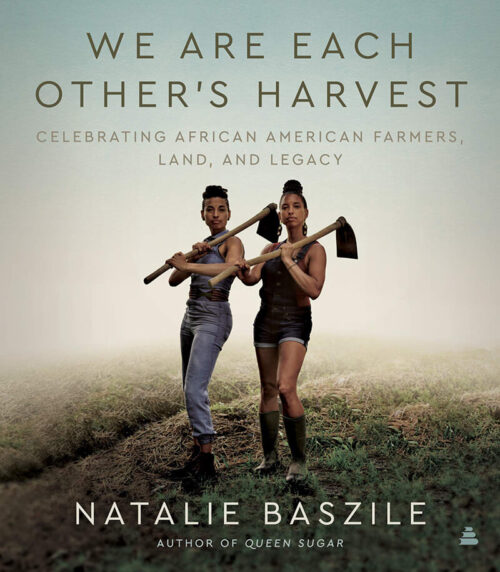 From the author of Queen Sugar—now a critically acclaimed series on OWN directed by Ava Duvernay—comes a beautiful exploration and celebration of black farming in America. In this impressive anthology, Natalie Baszile brings together essays, poems, photographs, quotes, conversations, and first-person stories to examine black people’s connection to the American land from Emancipation to today. In the 1920s, there were over one million black farmers; today there are just 45,000. Baszile explores this crisis, through the farmers’ personal experiences. In their own words, middle aged and elderly black farmers explain why they continue to farm despite systemic discrimination and land loss. The "Returning Generation"—young farmers, who are building upon the legacy of their ancestors, talk about the challenges they face as they seek to redress issues of food justice, food sovereignty, and reparations. These farmers are joined by other influential voices, including noted historians Analena Hope Hassberg and Pete Daniel, and award-winning author Clyde W. Ford, who considers the arrival of Africans to American shores; and James Beard Award-winning writers and Michael Twitty, reflects on black culinary tradition and its African roots. Poetry and inspirational quotes are woven into these diverse narratives, adding richness and texture, as well as stunning four-color photographs from photographers Alison Gootee and Malcom Williams, and Baszile’s personal collection. As Baszile reveals, black farming informs crucial aspects of American culture—the family, the way our national identity is bound up with the land, the pull of memory, the healing power of food, and race relations. She reminds us that the land, well-earned and fiercely protected, transcends history and signifies a home that can be tended, tilled, and passed to succeeding generations with pride. We Are Each Other’s Harvest elevates the voices and stories of black farmers and people of color, celebrating their perseverance and resilience, while spotlighting the challenges they continue to face. Luminous and eye-opening, this eclectic collection helps people and communities of color today reimagine what it means to be dedicated to the soil.
From the author of Queen Sugar—now a critically acclaimed series on OWN directed by Ava Duvernay—comes a beautiful exploration and celebration of black farming in America. In this impressive anthology, Natalie Baszile brings together essays, poems, photographs, quotes, conversations, and first-person stories to examine black people’s connection to the American land from Emancipation to today. In the 1920s, there were over one million black farmers; today there are just 45,000. Baszile explores this crisis, through the farmers’ personal experiences. In their own words, middle aged and elderly black farmers explain why they continue to farm despite systemic discrimination and land loss. The "Returning Generation"—young farmers, who are building upon the legacy of their ancestors, talk about the challenges they face as they seek to redress issues of food justice, food sovereignty, and reparations. These farmers are joined by other influential voices, including noted historians Analena Hope Hassberg and Pete Daniel, and award-winning author Clyde W. Ford, who considers the arrival of Africans to American shores; and James Beard Award-winning writers and Michael Twitty, reflects on black culinary tradition and its African roots. Poetry and inspirational quotes are woven into these diverse narratives, adding richness and texture, as well as stunning four-color photographs from photographers Alison Gootee and Malcom Williams, and Baszile’s personal collection. As Baszile reveals, black farming informs crucial aspects of American culture—the family, the way our national identity is bound up with the land, the pull of memory, the healing power of food, and race relations. She reminds us that the land, well-earned and fiercely protected, transcends history and signifies a home that can be tended, tilled, and passed to succeeding generations with pride. We Are Each Other’s Harvest elevates the voices and stories of black farmers and people of color, celebrating their perseverance and resilience, while spotlighting the challenges they continue to face. Luminous and eye-opening, this eclectic collection helps people and communities of color today reimagine what it means to be dedicated to the soil.
